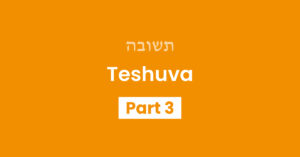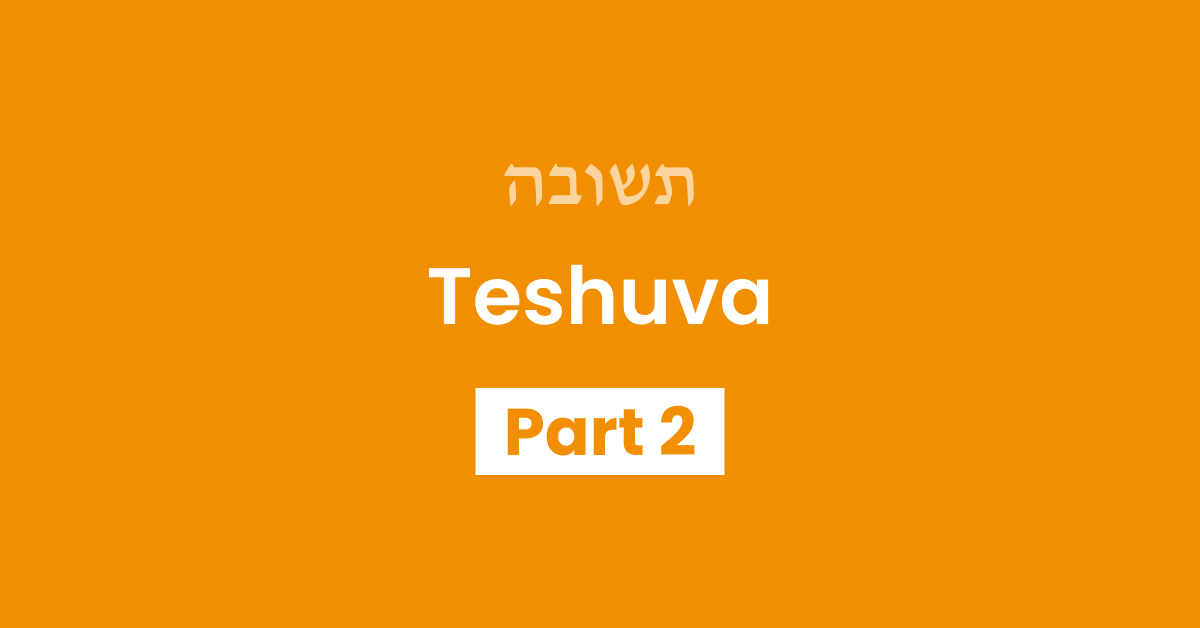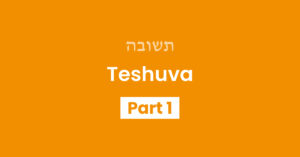In the past month, we have been discussing some concepts related to Teshuva and how to prepare for our upcoming Day of Judgment. First, we discussed how Teshuva starts with a Cheshbon HaNefesh – making an “accounting of the soul” to see which of our behaviors are bringing us eternal “profit” and which are causing us to incur eternal “losses.”
Next, we discussed how, in order to do a complete and proper Teshuva, a person must actually change their behavior. It’s not enough to just notice what we are doing wrong; we must make a clear plan and commitment for how exactly we are going to change for the better. The month of Elul is a special time for this kind of “active teshuva” and next month, Hashem will help us complete our Teshuva process with the special “tools” of the Shofar, Yom Kippur, and the 13 Middos of Mercy.
Finally, we discussed how every time we do a sin, it causes a corruption in the spiritual counterpart of that limb in the spiritual realm. Therefore, in order to do Teshuva on a deeper level, we can find opportunities to use those same limbs for mitzvah purposes. If someone used their eyes for seeing inappropriate sights, they can now use their eyes for looking at words of Torah. If someone used their hand for moving muktzeh items on Shabbos, they can now use their hands for giving tzedakah. If someone used their mouth for speaking words in anger, they can now use their mouth for giving compliments.
Putting the above ideas into practice will hopefully help us maximize our time in Elul and show Hashem we are taking serious steps to come closer to Him.
The Root of All Sins
In listing the different components of Teshuva, the Orchos Tzaddikim1 includes an interesting point. He writes: “The ninth aspect of Teshuva is Sheviras HaTa’avah (breaking one’s desires to indulge in forbidden things)… and one should even try to hold himself back from indulging in things that are permitted yet not absolutely necessary [for example, eating extra desserts which are enjoyable but are not needed to keep a person healthy and satiated].”
Why is this an essential component of a Teshuva? Let’s say a person is trying to do Teshuva for something totally unrelated to ta’avah, like saying Hashem’s name without kavannah. Why does he need to work on breaking his ta’avah as part of his Teshuva?
The Orchos Tzaddikim explains that giving into ta’avah is not just one specific sin; rather, ta’avah is at the root of every sin we do. As the Orchos Tzaddikim writes: “Ta’avah corrupts all actions.”
The Orchos Tzaddikim explains that giving into ta’avah is not just one specific sin; rather, ta’avah is at the root of every sin we do.
When a person gives into his desires, he is essentially saying: “I want to do this, so I’m going to do it. It doesn’t matter that Hashem doesn’t want me to do it. There are no rules I have to follow. Whatever I want to do is all that matters.” I want to eat this chocolate bar, so that’s what I’m going to do, and it doesn’t matter that it’s not healthy. I want to scream at my little sister so it doesn’t matter that onoas devarim (saying hurtful words) is forbidden; I want to do it anyway. I want to bite my nails on Shabbos and I don’t care that it’s forbidden; I want to do it anyway.”
But this is the opposite mindset of someone who wants to be a servant of Hashem. Someone who realizes the truth about this world – that there is a Creator who has a specific plan for this world and created each of us for a specific purpose – such a person will realize that there are rules and we cannot just do whatever we want.
Crowning Hashem as Our King
Recognizing that there are rules we have to follow and we cannot just do whatever we want is actually a fulfillment of the entire purpose of Rosh Hashanah – crowning Hashem as our King. Crowning Hashem as our King means realizing that Hashem’s will takes absolute priority. Nothing else matters other than what Hashem wants. It can never be that my own personal desires take precedence over what Hashem, my King and Creator, wants from me.
For this reason, it says in Tehillim: “Hashem will never despise a broken heart”2 and “Hashem is close to the brokenhearted.”3 On a simple level, these pesukim mean that Hashem is close and sympathetic to any person who feels sad.
But on a deeper level, the Sifsei Chaim4 interprets these pesukim to mean that Hashem is close to those who “break their own hearts” – meaning, they break their own personal desires in order to do Hashem’s will. When a person breaks his ta’avos (desires) in order to do Hashem’s will, it is the ultimate way to crown Hashem as his King and it is a fulfillment of the entire purpose of Creation.
When a person breaks his ta’avos (desires) in order to do Hashem’s will, it is the ultimate way to crown Hashem as his King and it is a fulfillment of the entire purpose of Creation.
The secular world today likes to adopt the opposite mindset, which is called “Sherirus HaLev – freedom of the heart.”5 Unfortunately, we live in a very “me”-focused generation with advertisements telling us every day that we can buy whatever we want, eat whatever we want, live wherever we want, marry whomever we want, and say whatever we want. Anyone who threatens this freedom is seen as being restrictive and old-fashioned.
But such a mindset could not be further from the truth! On what basis should I believe that I can do whatever I want? Did I create myself? Do I own my own right to exist? The truth is that I have no control over my own life or anything that happens to me. I am totally in the hands of, and at the mercy of Hashem. He created me, He continues to sustain me, and without Him, I would disappear into nothingness. Therefore, it only makes sense to say that His will is the only thing that matters in this world, and I had better listen to what He wants, if I want to continue to exist!
As we head into Rosh Hashanah when we will be crowning Hashem as our King, let’s try to remember to let go of the mindset of “I can do whatever I want.” Every time we can push ourselves to overcome our personal desires for the sake of Hashem, we will bring ourselves one step closer to Hashem and one giant leap toward helping the world reach its ultimate purpose.
Sources: [1] Orchos Tzaddikim: Shaar HaTeshuva; [2] Tehillim 51:19; [3] Tehillim 34:19; [4] Sifsei Chaim: Moadim Vol. 1 pg. 66; [5] See Devarim 29:18
Your Challenge
Once a day, notice something that you would naturally want to do, but then “break your desire” to do it, while saying (or just thinking): “I would naturally want to do ____, but there is a King in this world so I cannot just do whatever I want.”
FOR EXAMPLE:
- Stop yourself from eating something you shouldn’t eat
- Resist saying something you shouldn’t say
- Hold back from reading or looking at something you shouldn’t see
- Stop yourself from looking at your phone when you are in the middle of davening or talking to someone
- Overcome your desire to stay in bed for extra minutes in the morning
- Refrain from wearing something that might not be so tznius





